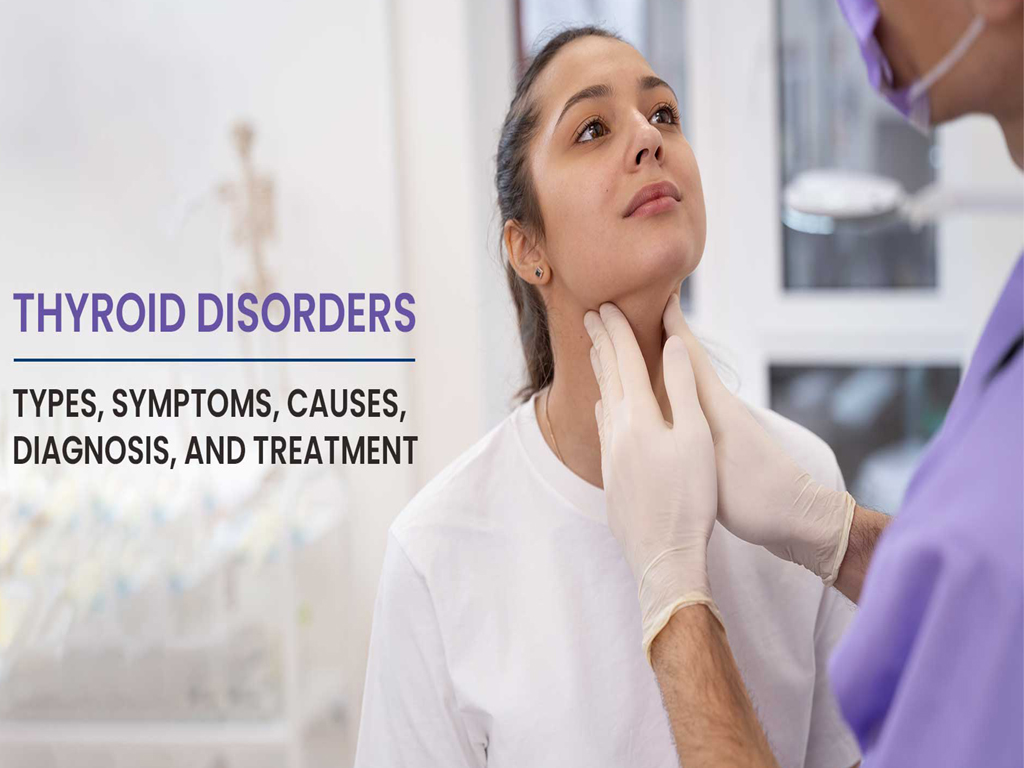Thyroid Definition:
The thyroid is a butterfly-shaped gland located in the front of the neck, just below the Adam’s apple. It plays a important role in the body’s metabolism by producing and releasing hormones that regulate a variety of bodily functions, including heart rate, body temperature, and energy production. The thyroid hormones it produces are thyroxine (T4) and triiodothyronine (T3), which influence nearly every cell in the body.
Common Thyroid Disorders:
-
Hypothyroidism (Underactive Thyroid):
- Definition: This occurs when the thyroid gland produces insufficient amounts of thyroid hormones.
- Symptoms: Fatigue, weight gain, sensitivity to cold, dry skin, constipation, and depression.
- Causes: Common causes include Hashimoto’s thyroiditis (an autoimmune condition), iodine deficiency, certain medications, or damage to the thyroid gland.
-
Hyperthyroidism (Overactive Thyroid):
- Definition: This occurs when the thyroid produces excessive amounts of thyroid hormones.
- Symptoms: Weight loss, rapid heartbeat, increased appetite, anxiety, sweating, and tremors.
- Causes: Graves’ disease (an autoimmune disorder), thyroid nodules, or inflammation of the thyroid (thyroiditis).
-
Goiter:
- Definition: An enlarged thyroid gland, which can occur with both hypothyroidism and hyperthyroidism.
- Symptoms: A visible swelling at the base of the neck, difficulty swallowing or breathing in severe cases.
- Causes: Iodine deficiency, thyroid nodules, or thyroiditis.
-
Thyroid Nodules:
- Definition: Lumps or growths that form in the thyroid gland, most of which are benign.
- Symptoms: Often asymptomatic, but can sometimes cause discomfort or difficulty swallowing if large.
- Causes: The cause is often unknown, though some nodules may be linked to certain genetic factors or iodine deficiency.
-
Thyroid Cancer:
- Definition: A rare but serious form of cancer that affects the thyroid gland.
- Symptoms: A lump or nodule in the neck, changes in voice, difficulty swallowing, and swollen lymph nodes.
- Causes: Genetic mutations, radiation exposure, or a family history of thyroid cancer.
Causes of Thyroid Disorders:
- Autoimmune Diseases: Conditions like Hashimoto’s thyroiditis (which leads to hypothyroidism) and Graves’ disease (which causes hyperthyroidism) occur when the immune system mistakenly attacks the thyroid gland.
- Iodine Deficiency: Iodine is essential for thyroid hormone production. In regions where iodine is deficient in the diet, individuals are at greater risk of developing thyroid problems, especially goiter.
- Genetic Factors: Family history and genetic mutations can increase the risk of certain thyroid disorders, including thyroid cancer and autoimmune thyroid disease.
- Pregnancy: Hormonal changes during pregnancy can affect thyroid function. Some women may develop postpartum thyroiditis (inflammation of the thyroid after childbirth).
- Medications: Certain medications, such as lithium (used to treat bipolar disorder) or amiodarone (a heart medication), can affect thyroid function.
- Radiation Exposure: Exposure to high levels of radiation, especially in the neck area, can damage the thyroid and increase the risk of thyroid cancer or other thyroid disorders.
- Aging: The risk of thyroid problems increases with age, particularly the development of hypothyroidism.
Treatments for Thyroid Disorders:
-
Hypothyroidism (Underactive Thyroid):
- Thyroid Hormone Replacement Therapy: The most common treatment is synthetic levothyroxine (a form of T4), which replaces the hormone that the thyroid is not producing enough of.
- Monitoring: Regular blood tests are required to monitor hormone levels and adjust dosage as needed.
-
Hyperthyroidism (Overactive Thyroid):
- Antithyroid Medications: Drugs like methimazole or propylthiouracil (PTU) can reduce the amount of thyroid hormones produced by the thyroid gland.
- Radioactive Iodine Therapy: This treatment involves swallowing a radioactive iodine capsule, which destroys thyroid tissue, reducing hormone production.
- Surgery: In some cases, removal of part or all of the thyroid (thyroidectomy) may be necessary, especially if there are thyroid nodules or cancer.
- Beta-blockers: Medications like propranolol may be used to control symptoms such as rapid heart rate or tremors.
-
Thyroid Nodules:
- Observation: Most thyroid nodules are benign and may not require immediate treatment. They are monitored for changes in size or symptoms.
- Biopsy: If there is suspicion of cancer, a fine needle aspiration (FNA) biopsy may be performed.
- Surgery: In rare cases where a nodule causes symptoms or is cancerous, part of the thyroid may be removed.
-
Goiter:
- Iodine Supplementation: If the goiter is caused by iodine deficiency, iodine supplements or a change in diet may help.
- Medications or Surgery: If the goiter is caused by thyroid disease (hypo- or hyperthyroidism), treating the underlying thyroid disorder will often reduce the goiter. In some cases, surgery is required to remove the goiter.
-
Thyroid Cancer:
- Surgery: The primary treatment is the removal of the thyroid gland (total thyroidectomy) or part of the thyroid (partial thyroidectomy), depending on the cancer type.
- Radioactive Iodine: After surgery, patients may be treated with radioactive iodine to destroy any remaining cancer cells.
- Thyroid Hormone Therapy: Post-surgery, patients will need thyroid hormone replacement therapy to compensate for the removal of the thyroid gland.
- Chemotherapy or Radiation: In more advanced cases, chemotherapy or external beam radiation may be used.
Thyroid disorders can range from mild and manageable to serious and life-threatening. Treatment depends on the type and severity of the disorder, and most conditions can be effectively managed with the right approach. Regular check-ups, blood tests, and monitoring of thyroid function are key to managing thyroid health. If you suspect a thyroid problem, it’s important to consult with a healthcare provider for accurate diagnosis and treatment.
5 Myths about Thyroid
Here are 5 common myths about the thyroid, along with the truths to help clarify misunderstandings:
-
Myth: Only Women Have Thyroid Problems
- Truth: While thyroid problems are more common in women, men can also develop thyroid disorders. In fact, about 1 in 8 women will experience thyroid problems in their lifetime, but men can also suffer from conditions like hypothyroidism, hyperthyroidism, and thyroid cancer. Certain thyroid disorders, such as Graves’ disease and Hashimoto’s thyroiditis, can occur in both genders, although they are more prevalent in women.
-
Myth: If You Have Thyroid Disease, You Will Always Gain Weight
- Truth: While hypothyroidism (underactive thyroid) can contribute to weight gain due to a slowed metabolism, not everyone with thyroid disease will experience significant weight changes. With the proper treatment, such as thyroid hormone replacement therapy, most people with hypothyroidism can manage their weight effectively. Similarly, hyperthyroidism (overactive thyroid) often leads to weight loss, but this is not always the case, and some individuals may not experience weight changes at all.
-
Myth: Thyroid Problems Are Always Obvious
- Truth: Thyroid disorders often have subtle or nonspecific symptoms that can easily be mistaken for other health issues. For instance, fatigue, weight fluctuations, mood changes, and changes in energy levels are symptoms of both hypothyroidism and hyperthyroidism, but they can also be caused by other conditions like stress, depression, or aging. Blood tests are necessary to accurately diagnose thyroid problems.
-
Myth: Thyroid Problems Are Only Caused by Genetics
- Truth: While genetics can play a role in thyroid diseases, environmental factors, lifestyle, and autoimmune conditions are also significant contributors. For example, iodine deficiency is a common cause of thyroid issues in some parts of the world, and autoimmune diseases like Hashimoto’s thyroiditis and Graves’ disease can also trigger thyroid dysfunction. Additionally, radiation exposure and certain medications can increase the risk of thyroid disorders.
-
Myth: If You Take Thyroid Medication, You Don’t Need to Monitor Your Thyroid
- Truth: Even if you’re on thyroid hormone replacement (such as levothyroxine for hypothyroidism), it’s essential to monitor thyroid hormone levels regularly. The dosage may need to be adjusted over time, especially as your body changes or if you experience changes in your health, weight, or diet. Regular blood tests are important to ensure that you’re taking the right amount of medication and that your thyroid levels remain balanced.
Conclusion:
There are many myths and misconceptions about thyroid health, but understanding the facts can help in managing thyroid conditions more effectively. If you’re experiencing symptoms that might suggest a thyroid issue, it’s essential to consult a healthcare provider for proper diagnosis and treatment.

